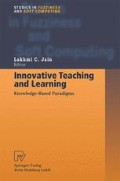Abstract
This chapter describes an innovative course developed and taught at The University of Alabama in which students in the College of Education are given an overview of artificial intelligence (AI) techniques including expert systems, fuzzy systems, neural networks, and genetic algorithms. The class, ESM 130: Artificial Intelligence Systems in Science, was developed and is team-taught by professors from the Colleges of Engineering and Education. When artificial intelligence techniques are taught in an engineering or computer science curriculum, the focus is generally on the mathematical or algorithmic details of the various techniques. In ESM 130, however, the focus is on the biological systems upon which most artificial intelligence techniques are based, and the subsequent modeling of the biological paradigm. The goal of the class is to provide future educators with enough information about the science of the twenty-first century to effectively educate, motivate, and stoke the fires of inquiry burning in their future students. To do this, they must have at least a fundamental understanding of artificial intelligence: what it is, where it comes from, and what it can be used for.
Access this chapter
Tax calculation will be finalised at checkout
Purchases are for personal use only
Preview
Unable to display preview. Download preview PDF.
References
American Association for the Advancement of Science (1993), Benchmarks for Science Literacy, Oxford University Press, New York.
Driver, R., Leach, J., Millar, R., and Scott, P. (1996), Young People’s Images of Science, Open University Press, Philadelphia, PA.
Karplus, R. (1979), “Teaching for the Development of Reasoning,” in A.E. Lawson (Ed.), 1980 AETS Yearbook: The Psychology of Teaching for Thinking and Creativity, ERIC/SMEAC, Columbus, OH.
Lawson, A.E., Abraham, M.R., and Renner, J.W. (1989), “A Theory of Instruction: Using the Learning Cycle to Teach Concepts and Thinking Skills,” National Association for Research on Science Teaching, Monograph #1, Atlanta, GA.
Piaget, J. (foreword), Furth, H.G. (1969), Piaget and Knowledge: Theoretical Foundations, Prentice Hall, Englewood Cliffs, NJ.
Sunal, D. and Sunal, C. (1991), “Young Children Learn to Restructure Personal Ideas About Growth in Trees,” School Science and Mathematics, Vol. 91, No. 7, pp. 18–25.
Author information
Authors and Affiliations
Editor information
Editors and Affiliations
Rights and permissions
Copyright information
© 2000 Springer-Verlag Berlin Heidelberg
About this chapter
Cite this chapter
Karr, C.L., Sunal, C., Smith, C. (2000). Artificial Intelligence Techniques for an Interdisciplinary Science Course. In: Jain, L.C. (eds) Innovative Teaching and Learning. Studies in Fuzziness and Soft Computing, vol 36. Physica, Heidelberg. https://doi.org/10.1007/978-3-7908-1868-0_3
Download citation
DOI: https://doi.org/10.1007/978-3-7908-1868-0_3
Publisher Name: Physica, Heidelberg
Print ISBN: 978-3-7908-2465-0
Online ISBN: 978-3-7908-1868-0
eBook Packages: Springer Book Archive

